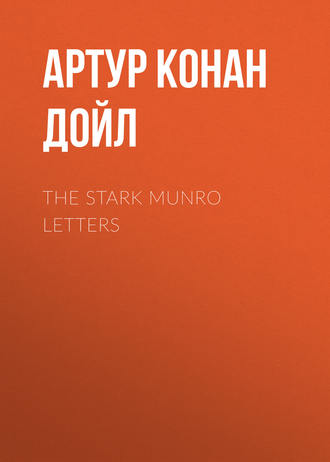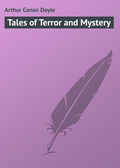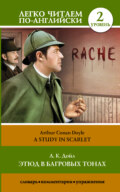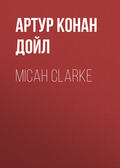
Артур Конан Дойл
The Stark Munro Letters
XII. OAKLEY VILLAS, BIRCHESPOOL, 5th June, 1882
When I had made all those dispositions which I described with such painful prolixity in my last letter, my dear Bertie, I sat down on my study chair, and I laid out the whole of my worldly wealth upon the table in front of me. I was startled when I looked at it, – three half-crowns, a florin, and four sixpences, or eleven and sixpence in all. I had expected to hear from Cullingworth before this; but at least he was always there, a trusty friend, at my back. Immediately upon engaging the house I had written him a very full letter, telling him that I had committed myself to keeping it for one year, but assuring him that I was quite convinced that with the help which he had promised me I should be able to hold my own easily. I described the favourable position of the house, and gave him every detail of the rent and neighbourhood. That letter would, I was sure, bring a reply from him which would contain my weekly remittance. One thing I had, above all, determined upon. That was that, whatever hardships might lie before me, I would fight through them without help from home. I knew, of course, that my mother would have sold everything down to her gold eye-glasses to help me, and that no thought of our recent disagreement would have weighed with her for an instant; but still a man has his feelings, you know, and I did not propose to act against her judgment and then run howling for help.
I sat in my house all day, with that ever-present sense of privacy and novelty which had thrilled me when I first shut the street door behind me. At evening I sallied out and bought a loaf of bread, half a pound of tea (“sweepings,” they call it, and it cost eightpence), a tin kettle (fivepence), a pound of sugar, a tin of Swiss milk, and a tin of American potted meat. I had often heard my mother groan over the expenses of housekeeping, and now I began to understand what she meant. Two and ninepence went like a flash, but at least I had enough to keep myself going for some days.
There was a convenient gas bracket in the back room. I hammered a splinter of wood into the wall above it, and so made an arm upon which I could hang my little kettle and boil it over the flame. The attraction of the idea was that there was no immediate expense, and many things would have happened before I was called upon to pay the gas bill. The back room was converted then into both kitchen and dining room. The sole furniture consisted of my box, which served both as cupboard, as table, and as chair. My eatables were all kept inside, and when I wished for a meal I had only to pick them out and lay them on the lid, leaving room for myself to sit beside them.
It was only when I went to my bedroom that I realised the oversights which I had made in my furnishing. There was no mattress and no pillow or bed-clothes. My mind had been so centred upon the essentials for the practice, that I had never given a thought to my own private wants. I slept that night upon the irons of my bed, and rose up like St. Lawrence from the gridiron. My second suit of clothes with Bristowe’s “Principles of Medicine” made an excellent pillow, while on a warm June night a man can do well wrapped in his overcoat. I had no fancy for second-hand bed-clothes, and determined until I could buy some new ones, to make myself a straw pillow, and to put on both my suits of clothes on the colder nights. Two days later, however, the problem was solved in more luxurious style by the arrival of a big brown tin box from my mother, which was as welcome to me, and as much of a windfall, as the Spanish wreck to Robinson Crusoe. There were too pairs of thick blankets, two sheets, a counterpane, a pillow, a camp-stool, two stuffed bears’ paws (of all things in this world!), two terra-cotta vases, a tea-cosy, two pictures in frames, several books, an ornamental ink-pot, and a number of antimacassars and coloured tablecloths. It is not until you own a table with a deal top and mahogany legs, that you understand what the true inner meaning of an ornamental cloth is. Right on the top of this treasure came a huge hamper from the Apothecaries’ Society with the drugs which I had ordered. When they were laid out in line, the bottles extended right down one side of the dining-room and half down the other. As I walked through my house and viewed my varied possessions, I felt less radical in my views, and begun to think that there might be something in the rights of property after all.
And I added to my effects in a marvellous way. I made myself an excellent mattress out of some sacking and the straw in which the medicine bottles had been packed.
Again, out of three shutters which belonged to the room, I rigged up a very effective side-table for my own den, which when covered with a red cloth, and ornamented with the bears’ paws, might have cost twenty guineas for all that the patient could say to the contrary. I had done all this with a light heart and a good spirit before the paralysing blow which I shall have to tell you about, came upon me.
Of course it was obvious from the first that a servant was out of the question. I could not feed one, far less pay one, and I had no kitchen furniture. I must open my door to my own patients – let them think what they would of it. I must clean my own plate and brush down my own front; and these duties must be thoroughly done, come what might, for I must show a presentable outside to the public. Well, there was no great hardship in that, for I could do it under the cover of night. But I had had a suggestion from my mother which simplified matters immensely. She had written to say that if I wished she would send my little brother Paul to keep me company. I wrote back eagerly to agree. He was a hardy cheery little fellow of nine, who would, I knew, gladly share hard times with me; while, if they became unduly so, I could always have him taken home again. Some weeks must pass before he could come, but it cheered me to think of him. Apart from his company, there were a thousand ways in which he might be useful.
Who should come in on the second day but old Captain Whitehall? I was in the back room, trying how many slices I could make out of a pound of potted beef, when he rang my bell, and I only just shut my mouth in time to prevent my heart jumping out.
How that bell clanged through the empty house! I saw who it was, however, when I went into the hall; for the middle panels of my door are of glazed glass, so that I can always study a silhouette of my visitors before coming to closer quarters.
I was not quite sure yet whether I loathed the man or liked him. He was the most extraordinary mixture of charity and drunkenness, lechery and self-sacrifice that I had ever come across. But he brought into the house with him a whiff of cheeriness and hope for which I could not but be grateful. He had a large brown paper parcel under his arm, which he unwrapped upon my table, displaying a great brown jar. This he carried over and deposited on the centre of my mantel-piece.
“You will permit me, Dr. Munro, sir, to place this trifle in your room. It’s lava, sir; lava from Vesuvius, and made in Naples. By – , you may think its empty, Dr. Munro, sir, but it is full of my best wishes; and when you’ve got the best practice in this town you may point to that vase and tell how it came from a skipper of an armed transport, who backed you from the start.”
I tell you, Bertie, the tears started to my eyes, and I could hardly gulp out a word or two of thanks. What a crisscross of qualities in one human soul! It was not the deed or the words; but it was the almost womanly look in the eyes of this broken, drink-sodden old Bohemian – the sympathy and the craving for sympathy which I read there. Only for an instant though, for he hardened again into his usual reckless and half defiant manner.
“There’s another thing, sir. I’ve been thinking for some time back of having a medical opinion on myself. I’d be glad to put myself under your hands, if you would take a survey of me.”
“What’s the matter?” I asked.
“Dr. Munro, sir,” said he, “I am a walking museum. You could fit what ISN’T the matter with me on to the back of a – visiting card. If there’s any complaint you want to make a special study of, just you come to me, sir, and see what I can do for you. It’s not every one that can say that he has had cholera three times, and cured himself by living on red pepper and brandy. If you can only set the – little germs sneezing they’ll soon leave you alone. That’s my theory about cholera, and you should make a note of it, Dr. Munro, sir, for I was shipmates with fifty dead men when I was commanding the armed transport Hegira in the Black Sea, and I know – well what I am talking about.”
I fill in Whitehall’s oaths with blanks because I feel how hopeless it is to reproduce their energy and variety. I was amazed when he stripped, for his whole body was covered with a perfect panorama of tattooings, with a big blue Venus right over his heart.
“You may knock,” said he, when I began to percuss his chest, “but I am – sure there’s no one at home. They’ve all gone visiting one another. Sir John Hutton had a try some years ago. ‘Why, dammy, man, where’s your liver?’ said he. ‘Seems to me that some one has stirred you up with a porridge stick,’ said he. ‘Nothing is in its right place.’ ‘Except my heart, Sir John,’ said I. ‘Aye, by – , that will never lose its moorings while it has a flap left.’”
Well, I examined him, and I found his own account not very far from the truth. I went over him carefully from head to foot, and there was not much left as Nature made it. He had mitral regurgitation, cirrhosis of the liver, Bright’s disease, an enlarged spleen, and incipient dropsy. I gave him a lecture about the necessity of temperance, if not of total abstinence; but I fear that my words made no impression. He chuckled, and made a kind of clucking noise in his throat all the time that I was speaking, but whether in assent or remonstrance I cannot say.
He pulled out his purse when I had finished, but I begged him to look on my small service as a mere little act of friendship. This would not do at all, however, and he seemed so determined about it that I was forced to give way.
“My fee is five shillings, then, since you insist upon making it a business matter.”
“Dr. Munro, sir,” he broke out, “I have been examined by men whom I wouldn’t throw a bucket of water over if they were burning, and I never paid them less than a guinea. Now that I have come to a gentleman and a friend, stiffen me purple if I pay one farthing less.”
So, after much argument, it ended in the kind fellow going off and leaving a sovereign and a shilling on the edge of my table. The money burned my fingers, for I knew that his pension was not a very large one; and yet, since I could not avoid taking it, there was no denying that it was exceedingly useful. Out I sallied and spent sixteen shillings of it upon a new palliasse which should go under the straw mattress upon my bed. Already, you see, I was getting to a state of enervating luxury in my household arrangements, and I could only lull my conscience by reminding myself that little Paul would have to sleep with me when he came.
However, I had not quite got to the end of Whitehall’s visit yet. When I went back I took down the beautiful lava jug, and inside I found his card. On the back was written, “You have gone into action, sir. It may be your fate to sink or to swim, but it can never be your degradation to strike. Die on the last plank and be damned to you, or come into port with your ensign flying mast-high.”
Was it not fine? It stirred my blood, and the words rang like a bugle call in my head. It braced me, and the time was coming when all the bracing I could get would not be too much. I copied it out, and pinned it on one side of my mantel-piece. On the other I stuck up a chip from Carlyle, which I daresay is as familiar to you as to me. “One way or another all the light, energy, and available virtue which we have does come out of us, and goes very infallibly into God’s treasury, living and working through eternities there. We are not lost – not a single atom of us – of one of us.” Now, there is a religious sentence which is intellectually satisfying, and therefore morally sound.
This last quotation leads to my second visitor. Such a row we had! I make a mistake in telling you about it, for I know your sympathies will be against me; but at least it will have the good effect of making you boil over into a letter of remonstrance and argument than which nothing could please me better.
Well, the second person whom I admitted through my door was the High Church curate of the parish – at least, I deduced High Church from his collar and the cross which dangled from his watch chain. He seemed to be a fine upstanding manly fellow – in fact, I am bound in honesty to admit that I have never met the washy tea-party curate outside the pages of Punch. As a body, I think they would compare very well in manliness (I do not say in brains) with as many young lawyers or doctors. Still, I have no love for the cloth. Just as cotton, which is in itself the most harmless substance in the world, becomes dangerous on being dipped into nitric acid, so the mildest of mortals is to be feared if he is once soaked in sectarian religion. If he has any rancour or hardness in him it will bring it out. I was therefore by no means overjoyed to see my visitor, though I trust that I received him with fitting courtesy. The quick little glance of surprise which he shot round him as he entered my consulting-room, told me that it was not quite what he had expected.
“You see, the Vicar has been away for two years,” he explained, “and we have to look after things in his absence. His chest is weak, and he can’t stand Birchespool. I live just opposite, and, seeing your plate go up, I thought I would call and welcome you into our parish.”
I told him that I was very much obliged for the attention. If he had stopped there all would have been well, and we should have had a pleasant little chat. But I suppose it was his sense of duty which would not permit it.
“I trust,” said he, “that we shall see you at St. Joseph’s.”
I was compelled to explain that it was not probable.
“A Roman Catholic?” he asked, in a not unfriendly voice.
I shook my head, but nothing would discourage him.
“Not a dissenter!” he exclaimed, with a sudden hardening of his genial face.
I shook my head again.
“Ah, a little lax – a little remiss!” he said playfully, and with an expression of relief. “Professional men get into these ways. They have much to distract them. At least, you cling fast, no doubt, to the fundamental truths of Christianity?”
“I believe from the bottom of my heart,” said I, “that the Founder of it was the best and sweetest character of whom we have any record in the history of this planet.”
But instead of soothing him, my conciliatory answer seemed to be taken as a challenge. “I trust,” said he severely, “that your belief goes further than that. You, are surely prepared to admit that He was an incarnation of the God-head.”
I began to feel like the old badger in his hole who longs to have a scratch at the black muzzle which is so eager to draw him.
“Does it not strike you,” I said, “that if He were but a frail mortal like ourselves, His life assumes a much deeper significance? It then becomes a standard towards which we might work. If, on the other hand, He was intrinsically of a different nature to ourselves, then His existence loses its point, since we and He start upon a different basis. To my mind it is obvious that such a supposition takes away the beauty and the moral of His life. If He was divine then He COULD not sin, and there was an end of the matter. We who are not divine and can sin, have little to learn from a life like that.”
“He triumphed over sin,” said my visitor, as if a text or a phrase were an argument.
“A cheap triumph!” I said. “You remember that Roman emperor who used to descend into the arena fully armed, and pit himself against some poor wretch who had only a leaden foil which would double up at a thrust. According to your theory of your Master’s life, you would have it that He faced the temptations of this world at such an advantage that they were only harmless leaden things, and not the sharp assailants which we find them. I confess, in my own case, that my sympathy is as strong when I think of His weaknesses as of His wisdom and His virtue. They come more home to me, I suppose, since I am weak myself.”
“Perhaps you would be good enough to tell me what has impressed you as weak in His conduct?” asked my visitor stiffly.
“Well, the more human traits – ‘weak’ is hardly the word I should have used. His rebuke of the Sabbatarians, His personal violence to the hucksters, His outbursts against the Pharisees, His rather unreasoning petulance against the fig-tree because it bore no fruit at the wrong season of the year, His very human feeling towards the housewife who bustled about when He was talking, his gratification that the ointment should have been used for Him instead of being devoted to the poor, His self-distrust before the crisis – these make me realise and love the man.”
“You are a Unitarian, then, or rather, perhaps, a mere Deist?” said the curate, with a combative flush.
“You may label me as you like,” I answered (and by this time I fear that I had got my preaching stop fairly out); “I don’t pretend to know what truth is, for it is infinite, and I finite; but I know particularly well what it is NOT. It is not true that religion reached its acme nineteen hundred years ago, and that we are for ever to refer back to what was written and said in those days. No, sir; religion is a vital living thing, still growing and working, capable of endless extension and development, like all other fields of thought. There were many eternal truths spoken of old and handed down to us in a book, some parts of which may indeed be called holy. But there are others yet to be revealed; and if we are to reject them because they are not in those pages, we should act as wisely as the scientist who would take no notice of Kirschoff’s spectral analysis because there is no mention of it in Albertus Magnus. A modern prophet may wear a broadcloth coat and write to the magazines; but none the less he may be the little pipe which conveys a tiny squirt from the reservoirs of truth. Look at this!” I cried, rising and reading my Carlyle text. “That comes from no Hebrew prophet, but from a ratepayer in Chelsea. He and Emerson are also among the prophets. The Almighty has not said His last say to the human race, and He can speak through a Scotchman or a New Englander as easily as through a Jew. The Bible, sir, is a book which comes out in instalments, and ‘To be continued,’ not ‘Finis,’ is written at the end of it.”
My visitor had been showing every sign of acute uneasiness during this long speech of mine. Finally, he sprang to his feet, and took his hat from the table.
“Your opinions are highly dangerous, sir,” said he. “It is my duty to tell you so. You believe in nothing.”
“Nothing which limits the power or the goodness of the Almighty,” I answered.
“You have evolved all this from your own spiritual pride and self-sufficiency,” said he, hotly. “Why do you not turn to that Deity whose name you use. Why do you not humble yourself before Him?”
“How do you know I don’t?”
“You said yourself that you never went to church.”
“I carry my own church about under my own hat,” said I. “Bricks and mortar won’t make a staircase to heaven. I believe with your Master that the human heart is the best temple. I am sorry to see that you differ from Him upon the point.”
Perhaps it was too bad of me to say that. I might have guarded without countering. Anyhow; it had the effect of ending an interview which was becoming oppressive. My visitor was too indignant to answer, and swept out of the room without a word. From my window I could see him hurry down the street, a little black angry thing, very hot and troubled because he cannot measure the whole universe with his pocket square and compasses.
Think of it, and think of what he is, an atom among atoms, standing at the meeting point of two eternities! But what am I, a brother atom, that I should judge him?
After all, I own to you, that it might have been better had I listened to what he had to say, and refused to give my own views. On the other hand, truth MUST be as broad as the universe which it is to explain, and therefore far broader than anything which the mind of man can conceive. A protest against sectarian thought must always be an aspiration towards truth. Who shall dare to claim a monopoly of the Almighty? It would be an insolence on the part of a solar system, and yet it is done every day by a hundred little cliques of mystery mongers. There lies the real impiety.
Well, the upshot of it all is, my dear Bertie, that I have begun my practice by making an enemy of the man who, of the whole parish, has the most power to injure me. I know what my father would think about it, if he knew.
And now I come to the great event of this morning, from which I am still gasping. That villain Cullingworth has cut the painter, and left me to drift as best I may.
My post comes at eight o’clock in the morning, and I usually get my letters and take them into bed to read them. There was only one this morning, addressed in his strange, unmistakable hand. I made sure, of course, that it was my promised remittance, and I opened it with a pleasurable feeling of expectation. This is a copy of what I read: —
“When the maid was arranging your room after your departure, she cleared some pieces of torn paper from under the grate. Seeing my name upon them, she brought them, as in duty bound, to her mistress, who pasted them together and found that they formed a letter from your mother to you, in which I am referred to in the vilest terms, such as ‘a bankrupt swindler’ and ‘the unscrupulous Cullingworth.’ I can only say that we are astonished that you could have been a party to such a correspondence while you were a guest under our roof, and we refuse to have anything more to do with you in any shape or form.”
That was a nice little morning greeting was it not, after I had, on the strength of his promise, started in practice, and engaged a house for a year with a few shillings in my pocket? I have given up smoking for reasons of economy; but I felt that the situation was worthy of a pipe, so I climbed out of bed, gathered a little heap of tobacco-dust from the linings of my pocket, and smoked the whole thing over. That life-belt of which I had spoken so confidingly had burst, and left me to kick as best I might in very deep water. I read the note over and over again; and for all my dilemma, I could not help laughing at the mingled meanness and stupidity of the thing. The picture of the host and hostess busying themselves in gumming together the torn letters of their departed guest struck me as one of the funniest things I could remember. And there was the stupidity of it, because surely a child could have seen that my mother’s attack was in answer to my defence. Why should we write a duet each saying the same thing? Well, I’m still very confused about it all, and I don’t in the least know what I am going to do – more likely to die on the last plank, than to get into port with my ensign mast-high. I must think it out and let you know the result. Come what may, one thing only is sure, and that is that, in weal or woe, I remain, ever, your affectionate and garrulous friend.






